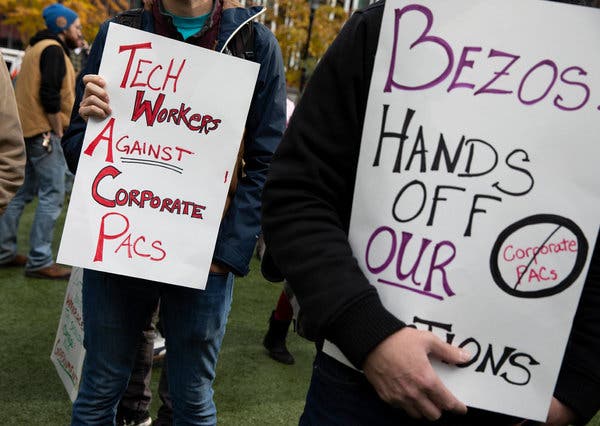Advertisement
A new law knocks “foreign-influenced” corporations out of city politics by working with the decision, not fighting it.
By Ellen L. Weintraub
Ms. Weintraub is a commissioner on the Federal Election Commission.

On Monday, the Seattle City Council responded to Citizens United, the infamous Supreme Court decision that has drowned our elections in a sea of largely unregulated cash for the past decade.
Instead of trying to repeal or ignore the 2010 ruling (two wildly popular options that aren’t actually legal), the council applied it to city elections on its own terms, passing a law that gives life to a theory I put forward in 2016. The theory, in a nutshell: Citizens United allowed corporations to spend freely in politics, calling them “associations of citizens”; their right to do so flows from the collective First Amendment rights of their individual shareholders. It logically follows, then, that restrictions on the rights of shareholders must also apply to the corporation.
One of our most important campaign-finance limits is that “foreign nationals” are barred from spending in any American election, city, state or federal. Since that’s true for individual foreigners, it must also be true for the corporations owned in whole or in part by them. One cannot have a right collectively that one does not have individually.
Seattle’s law, similar to one passed in St. Petersburg, Fla., in 2017, requires corporations that seek to spend in city elections to certify that they are not “foreign-influenced corporations,” and are, thus, in compliance with both Citizens United and federal statutes. Seattle defined any corporation as “foreign-influenced” when more than 1 percent of it is owned by an individual foreign entity, or more than 5 percent is owned in aggregate by two or more foreign entities. These are tight standards, but arguably, not as tight as the zero-tolerance standard that a strict reading of federal law would suggest.
The Seattle law covers independent expenditures and campaign contributions for candidate elections, but not ballot issues. That’s because some legal scholars think that the key case in this area of law, Bluman v. F.E.C., which upheld the foreign-national political spending prohibition, applies only to express advocacy in candidate elections. This stems mainly from a bit of nonbinding language in the decision in Bluman, written by Brett Kavanaugh when he was a judge on the Court of Appeals for the District of Columbia.
Seattle, along with other cities and states, doesn’t need to worry. No court has ever come close to holding that the Federal Election Campaign Act’s ban on political spending by foreign nationals is improper. And by its terms, the federal statute has a broad reach that goes well beyond barring foreign governments from purchasing advertising that expressly calls for the election or defeat of candidates in American elections.
Under federal election law, it is unlawful for “a foreign national, directly or indirectly, to make a contribution or donation of money or other thing of value, or to make an express or implied promise to make a contribution or donation, in connection with a federal, state or local election.”
This “in connection with” language is much broader than language we see in other election-law contexts. And the law covers the full range of foreign actors: individuals, corporations and governments. It thus bars Russia (or any other foreign entity) from purchasing ads on issues like Black Lives Matter or hiring troll farms to write Twitter posts, if those ads and posts are in connection with an American election. And it certainly bars foreign entities from spending money to hack into state-level voter databases.
That’s the legal argument. And at the end of the day, most judges, even Supreme Court justices, are practical creatures. When Judge Kavanaugh — who has taken a dim view of the government’s ability to regulate campaign finance — had the Bluman case before him, he could have ruled differently. He could have found that the First Amendment allows foreign nationals to influence our elections by applying Citizens United’s prohibition on “restrictions distinguishing among different speakers.” But he declined to adopt that extreme position, faced with what would have been a breathtaking relinquishment of the United States’ power to control its destiny.
Instead, he wrote:
“Foreign citizens do not have a constitutional right to participate in, and thus may be excluded from, activities of democratic self-government. It follows, therefore, that the United States has a compelling interest for purposes of First Amendment analysis in limiting the participation of foreign citizens in activities of American democratic self-government, and in thereby preventing foreign influence over the U.S. political process.”
Our democracy is under sustained and vigorous attack from our chief geopolitical adversaries. If even a very conservative Supreme Court is asked to rule that the government is powerless to stop hostile foreign interests from surreptitiously acting to influence our elections, I have difficulty believing it will do so. It is one thing to find that the First Amendment bars a campaign-finance law from applying to citizens. It is quite another to hold that the First Amendment requires unconditional national surrender to foreign attempts to undermine our democracy. No judge should have an appetite for the latter.
Ellen L. Weintraub (@EllenLWeintraub) is a commissioner on the Federal Election Commission.
The Times is committed to publishing a diversity of letters to the editor. We’d like to hear what you think about this or any of our articles. Here are some tips. And here’s our email: letters@nytimes.com.
Follow The New York Times Opinion section on Facebook, Twitter (@NYTopinion) and Instagram.

